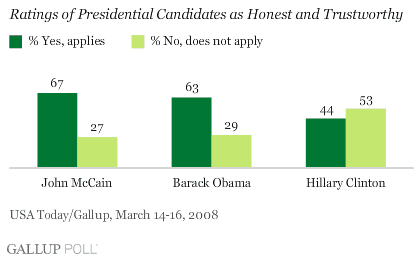Clinton's perceived honesty gap and some basic questions

A new Gallup poll has it in pretty stark numbers: a majority of Americans don't consider Hillary to be honest.
Obama and McCain's numbers are within the margin of error, so they are essentially tied with 2:1 ratios of voters trusting them to be honest.
It's something that I've flagged as a problem of hers before, and the results don't surprise me, because those numbers include both Democrats and Republicans. Hell, the thing I hear the most from people who don't like Hillary when I ask "why?" is "I don't trust her."
Now, this trust issue spans a lot - it spans that they don't trust her to tell the truth, but it includes not trusting her to fully defend progressive values, not trusting her to lead our country in the right direction. Some of this is mistrust on how she's seemingly willing to tear down the party to prevent someone, anyone else from winning the presidency (on the Democratic side.) Some people don't trust her because she used to be a College Republican and they think she continues to use Republican tactics. But I also hear it from apolitical people and swing voters, as well as Republicans. I hear it from Asian Americans, Latinos, whites, and African Americans. I hear it from all ages.
I'd say this is her major hurdle to overcome. The general populace is inclined to believe that she has the experience. They just don't believe that she won't use that experience to either stab us in the back or to fail to stand up for the little guy or girl.
One of the only positive side effects of the rev. Wright thing is that it has helped to wash away the Muslim smear. Instead there's a black nationalist smear. But Obama took a risk and was open and honest about how he personally connects to the issue. And I think that people appreciate that kind of courage and convictions.
It would have been easy for him to throw Rev. Wright under the bus, to completely disown him. But Obama didn't - he said, this man has raised me and brought me into the church. That shows loyalty, a kind of loyalty that the Clinton's haven't shown to their supporters, for the most part. During the Clinton-Gore campaign of 96, the APIA community got shafted and scapegoated for participating in our democracy. Staffers were afraid for their jobs, leaders felt silenced and our community - which was very much still emerging at the time, just on the cusps of starting some foundational new organizations - well, we just shut up. (There's a lot of reasons for this, including lack of infrastructure and even less power then. Check previous posts.)
I keep referencing this because if they would distance themselves from us over some bad checks, what do you think they would do if it comes to a harder issue of deeper importance, like immigration and keeping families together? I don't mean on an individual case by case basis but rather if the GOP wants to use us as the economic grinding-stone of white working class anger? Listen to Obama's speech for a good perspective on both sides.
It's already happening to some degree, and I've seen this movie before. It doesn't end pretty. In 1996, hate crimes increased 17 percent. In the 80s, there was the beating of Vincent Chin and movies like Rising Sun. There's legislation out there that would more clearly define and punish those who perpetuate hate crimes, and we can't seem to get it passed.
Hillary has proven that she fumbles hot potatoes like the drivers licenses issue, that she finds these issues radioactive. But the question is: when will she take a stand? My fear is that despite everything that there is to admire about her (and there is a significant amount), she either won't stand up for our community on the most important issues and really put her weight to bear on preventing bad legislation or passing good bills. Or that she'll fumble because she lacks the coalition building ability like with HillaryCare.
Obama puts himself in everybody's shoes, and as painful as that thought is to some reflexive progressives, I think it makes for a better argument for our case at the end of the day. It helps you spot the objections that other parties have and to address them. Too frequently, we are blind and deaf to the base concerns of Americans, and that's why we are unable to seal the deal.
Obama listens, and that informs his speeches. He makes his position and our position the majority one in simple and plain terms that make it easy for people to understand why he supports his positions.
One could argue that he puts himself in everybody's shoes because he has to walk in a lot of paths, but the who and why is not as important as the how. Because the how is what allows you to walk further down that path and to cross the bridge.


0 Comments:
Post a Comment
<< Home